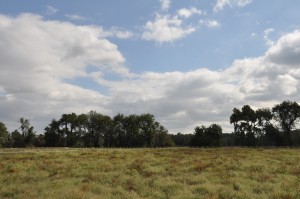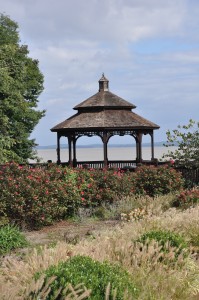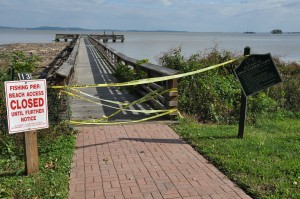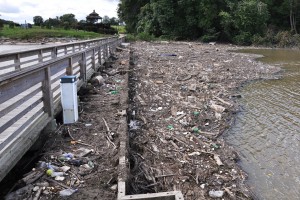Pay attention, folks. We are trashing the world and hurricanes and the ensuing floods are throwing it back at us. Making a wreck of our world is not like making a wreck of our childhood bedrooms—Mother Nature, unlike our own mothers, cannot pick up the garbage we strew and municipal, county, state and federal services are either unwilling or unable to take care of the mess.
I would, perhaps, remain in denial of the situation except for the fact that perfect autumn weather summoned me beyond the confines of my yard.
The fourth of October was the kind of day I live for: azure sky with puffs of white cloud, breezes that set the bronzing foliage aquiver, temperatures cool enough to make even me grab a jacket from the hall closet. “Let’s walk,” said my Dear One, and I asked, “Where”? “Swan Harbor Farm,” he answered.
A perfect choice. There was no wedding at the big house, no activity at the Senator William Amoss Agricultural Center; except for the bluebirds socializing in the cherry trees that line the long driveway and a turkey vulture drifting high above, we seemed to have this old farm on the edge of the Chesapeake Bay all to ourselves.
At Swan Harbor Farm, a couple of runoff ponds have been constructed on old cornfields adjacent to the model-plane park. Reeds and wildflowers have softened their edges; a figure-eight of walkways encircle them. From them we glimpsed the Bay, and the pavilion that lords over the fishing pier. We ambled down the slope and as we approached, I could read this sign:
SWAN HARBOR FARM
HARFORD COUNTY DEPARTMENT OF PARKS & RECREATION
— AND —
DEPARTMENT OF NATURAL RESOURCES
PROGRAM OPEN SPACE
THE WATERWAY IMPROVEMENT FUND
Your Boat Tax at Work
We circled the pavilion and walked toward the shore. Yellow tape barred access and a notice stated “access closed until further notice.”
We walked—illicitly and cautiously—onto the pier. The sight was sickening. The water northside of the pier was obscured by a pack of debris: driftwood, Styrofoam blocks, old tires, plastic bottles, glass bottles, softballs, and at least one flip-flop. The mass was so dense it looked like it would support my weight if I were to step onto it. Water still flows under the pier, carrying small bits away and leaving the shoreline and southerly areas relatively clean.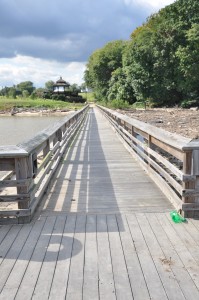
This filth had obviously been there since Hurricanes Irene and Lee roiled the coastal waters and flushed fallen wood and trash from the banks of the Susquehanna into the Chesapeake Bay.
The scene is shocking.
What is wrong with people? Do they think it is okay just to toss that soda can out a car window, drop a worn-out tire into a ravine, and shove the paper and plastic that wrapped fast food into storm drains? Are humans so convinced that befouling the air and land where they walk and live is a right that causes no harm and is nobody else’s business?
I am disgusted by wanton pollution of the resources that we depend on for livelihoods and for life itself. I am outraged by the arguments that we cannot “afford” to clean up and keep clean the land, the water, and the air. I am stunned by the stupidity of those who believed that protecting business profits in the short term does more good than preserving the natural world that sustains our economy in the long term.
Open your eyes and ears and noses and lungs, people. When we litter, when we dump unnecessary fertilizers and pesticides on our lawns, when we “pave Paradise and put up a parking lot,” it matters. The trash we toss on the ground today accumulates and will compromise the wellbeing of our children tomorrow. The resources we squander in search of financial gain cannot be replenished. We destroy beauty that can belong to all to erect ugliness that is the property of the few.
As for all the departments of parks and recreation, the departments of natural resources, the programs dedicated to open space and the preservation of lakes, rivers and seacoasts: you’ve got our taxes; now please pay someone to go clean up the mess.

